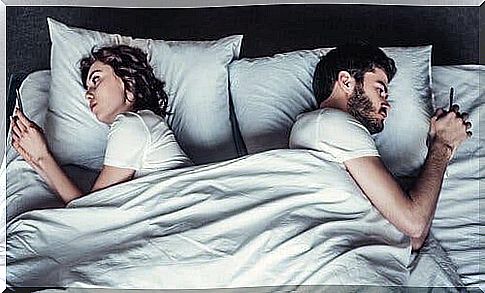Digital Insomnia And How To Stop It

Read all about digital insomnia in this article!
Many people use their cell phone or computer before bedtime. Afterwards, they have a hard time falling asleep. This is because electronic devices emit a blue light, which affects our brain by reducing the secretion of melatonin. Melatonin is a hormone that tells the body that now is the time to sleep.
The phenomenon is known as digital insomnia, which is a condition that affects sleep. It can either make the person sleep less, or provide poorer quality sleep. And it’s not just because of the effect of lights and screens. It is also because we become unable to free ourselves from our everyday worries.
Brain overstimulation can lead to digital insomnia
Many just check their phones before going to bed, and quite a few do so when they wake up in the middle of the night. For many people, this is also the first thing they do as soon as they wake up. This means that we cannot free ourselves from technology, social media or work, even though we should rest.
The constant stream of screens, images and hyperactivity that the Internet has brought with it overstimulates the brain. This causes the nervous system to send signals that are contrary to what the body needs late at night.

Digital insomnia and screen light
As we mentioned above, the artificial light emitted from devices such as mobile phones, laptops and tablets is one of the most common causes of digital insomnia. This is because the blue light interferes with the secretion of melatonin.
This hormone should start being released at least an hour before we fall asleep. But the effect of the blue light changes the process, and then it becomes harder for us to fall asleep. Some devices, such as e-book readers, where the screen is usually opaque and black and white, are less harmful.
What are the main causes of this problem?
In addition to the blue light from the electronic devices, there are also other factors that contribute to digital insomnia.
Excessive TV watching
Spending too much time in front of the television, especially just before going to bed, can change your sleep quality. A less harmful activity is reading before bedtime, which can help you relax.
When you do not really drop the phone
When you use your phone as an alarm clock, and have it lying on your bedside table, then your phone is no longer just a phone. It is a device that you use at all times. In addition, using the phone before bedtime makes it impossible to let go of social networks and everyday worries.

Online gaming can contribute to digital insomnia
Online gaming can really become addictive. Many people spend hours immersed in these games, and play until their bedtime.
In addition, the games have recently ceased to be aimed almost exclusively at children and teenagers. Nowadays, people of all ages play, and although there may be something positive about it, it can cause sleep problems.
How to get a hyperactive brain to relax?
Although digital insomnia is a growing problem, there are various solutions that can reduce the negative effect that technology has on our sleep. An interesting example is singing goodnight songs.
Traditional songs that parents have used for ages to get kids to fall asleep have been built into several mobile apps to make us sleep better. Ironically, this means using a mobile phone to fall asleep.
Alternatively, you can use earplugs, which make it possible to isolate yourself from outside noise that prevents you from falling asleep. You can also use white noise to divert attention from the distractions that bother you at bedtime. Reading is also highly recommended.
First and foremost, you should reduce the amount of time you spend on electronic devices. You can even choose to use sleeping pills, but then you should talk to your doctor first.









